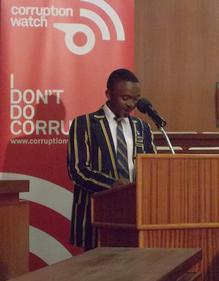|
Getting your Trinity Audio player ready...
|
 Our heroes this week are the Free State pupils who so enthusiastically embraced the inaugural Corruption Watch / Debate Afrika Model Youth South Africa challenge – those who made it to the participation stage, and those who wanted to but were unsuccessful.
Our heroes this week are the Free State pupils who so enthusiastically embraced the inaugural Corruption Watch / Debate Afrika Model Youth South Africa challenge – those who made it to the participation stage, and those who wanted to but were unsuccessful.
The challenge, which focused on tackling corruption in schools, started in March with ten teams of five learners each. In phase one the teams had to establish media campaigns with the theme My corruption-free school, and promote these in their schools and communities.
One member of each team had to lead the process of the second phase, a policy essay, while another two would prepare speeches for the third and final stage.
This was held as a Parliamentary-style debate, where teams argued for and against capital punishment for corruption offenders. Prizes were given to the overall winners, as well as winners from stages one and two and the best speaker on the day.
The standard was high and pupils addressed the challenge with eagerness and commitment.
Chief adjudicator Zola Valashiya, of Debate Afrika, commended their hard work: “I thank you for taking this whole process seriously and making every effort to research your topics and to read as much on the topic as possible.”
These youngsters and their peers should not view themselves as leaders of tomorrow, Corruption Watch’s executive director David Lewis told them, but rather as leaders of today who have the capability to positively influence South Africa’s future, especially on issues that directly affect them – such as corruption in their schools.



